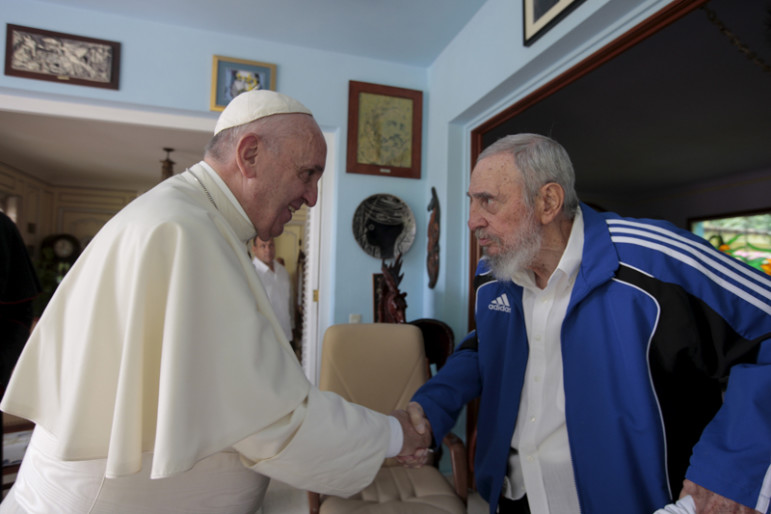Pope Francis met with aging revolutionary Communist Fidel Castro on Sunday (Sep. 20) in Castro’s home, where they chatted “informally” about “protecting the environment and the great problems of the contemporary world,” according to Vatican Radio.
And Castro had a gift for Francis — a copy of “Fidel and Religion” — a book based on 23 hours of interviews between him and Frei Betto, a Brazilian Dominican friar. The focus of the book is Fidel’s views on “two of the most important historic wellsprings of man’s thinking and emotions — Christianity and Marxism.”
How do I know this? I have a 1988 English edition of the 1985 book, purchased years ago in a second hand book shop in Miami.
Castro not only knows his former faith, he has practice chatting with popes, having met both Saint John Paul ll in 1998 and retired Pope Benedict XVI in 2012.
Sadly, it’s been too many years since I read “Fidel and Religion” but even a quick scan turns up interesting nuggets:
- Betto’s introduction says the book’s viewpoint is “the possibility of a need for deep human understanding among all who honestly struggle for the peoples, no matter what their ideas about God and relIgion may be.” Betto quotes a slogan from the Cuban revolution’s early years that might endear Fidel to Francis: “He who betrays the poor betrays Christ.”
- Fidel was a restless student at a Mass-every-morning Jesuit high school where the faith offered was “very dogmatic.” In his view, “religious faith, like political belief, should be based on reasoning, on the development of thought and feelings. The two things are inseparable.” Nonetheless, he went on religious retreats and said his regular prayers, if “mechanically.” And the Jesuits “influenced me with their strict organization, their discipline and their values. … They influenced my sense of justice…”
(Lest anyone get a rosy impression, the Wall Street Journal also reminds us that once Castro came to power and established a No-Catholics-allowed Communist Party, he closed down that prestigious school, declared Cuba to be an atheist state, expelled many priests and nuns, sent Cardinal Jaime Ortega to a work camp and canceled Christmas for three decades.)
- In his book, Fidel sees “great coincidence between Christianity’s objectives and the ones we Communists seek, between the Christian teachings of humility, austerity, selflessness and loving thy neighbor and what we might call the content of a revolutionary’s life and behavior.”
However, he points out later that he never really developed a personal religious faith because he was entirely “devoted to the development of a political faith.”
“Christ didn’t choose the rich to preach the doctrine; he choose 12 poor ignorant workers — that is he chose the proletariat of the times… At times I’ve referred to Christ’s miracles and have said, ‘Well, Christ multiplied the fish and the loaves to feed the people. That is precisely what we want to do with the Revolution and socialism…’ ”
He offers his interpretations of other parables and says the Sermon on the Mount “cannot be given any interpretation other than what you call the option for the poor… I believe Karl Marx could have subscribed to the Sermon on the Mount.”
Castro’s critique of the historic Catholic Church is that it has been used “as a tool for domination, exploitation and oppression for centuries.” Yet he has kind words for exceptions to this. When U.S. bishops visited in 1985, Castro met with them and praised Christian concepts of sacrifice, austerity and humility.
Said Fidel “I told them that if they organized a state in accord with Christian precepts, they’d create one similar to ours.”
The 353-page book goes year by year through Fidel’s life and his philosophy. But I’ll skip to one last point.
On compatriot in Communist revolution Ernesto (Che) Guevera, whose image loomed over Revolutionary Square where the pope offered Mass on Sunday, Fidel says, “If Che has been a Catholic, if Che had belonged to the Church, he would probably have been made a saint.”
Pope Francis gave Castro several books, including one by Italian priest Alessandro Pronzato and another by Spanish Jesuit Segundo Llorentea. The Holy Father also gave him a book and two CDs of his homilies, as well as his two encyclical letters, Lumen Fidei and Laudato Si’.





